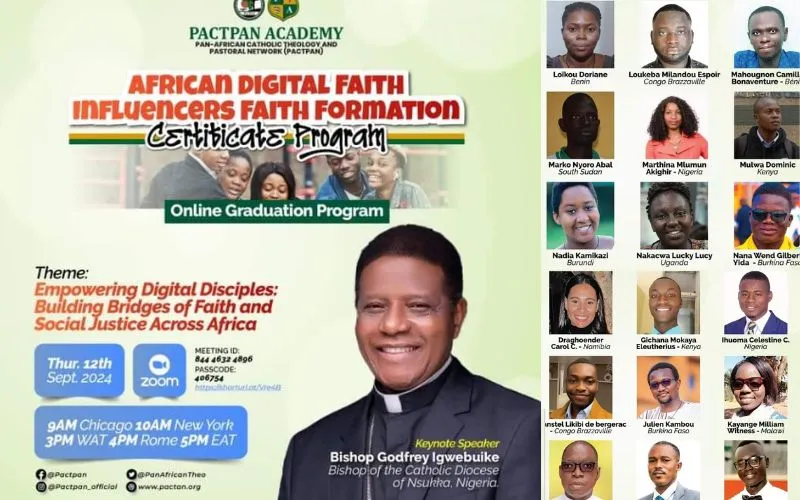Emphasizing Pope Francis’ message on reaching out to the peripheries, Bishop Onah expressed gratitude to the Holy Father, who he said is always encouraging the people of God to take new initiatives, and not to just continue doing business as usual, “but to explore new grounds even at the risk of being wounded.”
“We are reminded of the Holy Father saying that he prefers a Church that is soiled, dirtied and wounded while ministering to people especially in difficult areas, to a Church that remains clean and pure because it doesn’t dare to risk,” Bishop Onah said.
He added, “When we come before God, perhaps, we will present to Him our clean hands, having done everything to prevent ourselves from being stained by the world. I may say ‘Father, my hands are clean’, but He will tell me ‘yes, they are clean, but they are also empty’. It is a risky business, a business in which we may soil our hands, but it will definitely not be empty.”
The Catholic Church leader encouraged digital faith influencers, especially those who enjoy creating content to accept to be evangelized on digital platforms as well.
“There are several ways of looking at the digital world. One way is looking at digital technologies as a tool for evangelization, for communication, for human interactions, for governance, for many things,” he said, adding that digital technologies as “tool” is the sense in which the Church sees the digital world, encouraging young people especially, to engage the modern tools of technology to spread the message of the Gospel.
(Story continues below)
He said the digital world as “the recipient of evangelization” is subtle, adding, “My challenge to the graduands and to all of us in this digital era is not to just see the digital world as an instrument of evangelization, no matter how well we are able to use it, but as subjects needing to be evangelized.”
In his address at the graduation ceremony, the First Assistant of the Secretary General of the Symposium of Episcopal Conference of Africa and Madagascar (SECAM), Fr. Alfred Bebodu, challenged the young graduands to amplify the voice of reason in digital spaces.
Fr. Bebodu lauded the young influencers for investing their hard work and dedication in completing eight months of training, saying, “Your commitment reflects the vibrancy of the Church in Africa, and it fills us with hope for the future.”
“You are now entrusted with great responsibility to be voices of faith and reason in the digital space, addressing not only spiritual matters, but also social, economic and environmental challenges facing our continent,” he said.
The member of the Clergy of Ghana’s Catholic Diocese of Sekondi-Takoradi reminded the graduands that the mission of SECAM has always been to promote evangelization and integral human development for all the people of God in Africa and its islands.
He said that the young people’s role as Digital Faith Influencers perfectly aligns with the SECAM mission.
“As we prepare for the Jubilee Year, marking a significant milestone for the Church in Africa next year, we also look to the future with vision and commitment. One of the priorities for the next 25 years will be the integration of technology in evangelization,” he said.
The SECAM official warned the young faith influencers that the digital era is a sensitive one, requiring that it is carefully studied.
Digital technologies, he said, are tools that can either procure much success in helping evangelization or bring about destruction.
“Strategy comes to play,” Fr. Bebodu said, and added, “The Church in Africa invites you, the graduates of Digital Faith Influencers Program, with your unique skills and fresh perspectives.”
“We envision platforms that will cultivate the hearts of the youths and broader communities fostering both spiritual growth and social cohesion. Your creativity, knowledge and passion will be instrumental in realizing this vision,” the Ghanaian Catholic Priest said.
Agnes Aineah is a Kenyan journalist with a background in digital and newspaper reporting. She holds a Master of Arts in Digital Journalism from the Aga Khan University, Graduate School of Media and Communications and a Bachelor's Degree in Linguistics, Media and Communications from Kenya's Moi University. Agnes currently serves as a journalist for ACI Africa.





